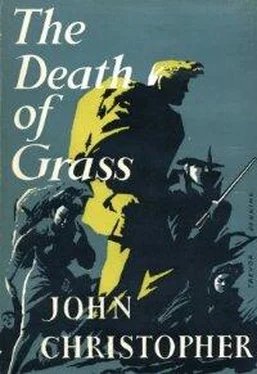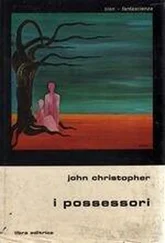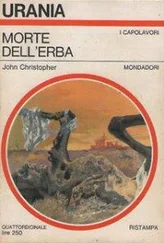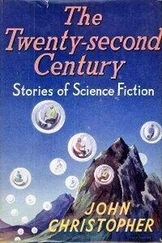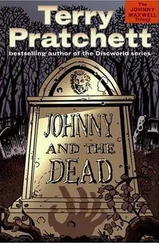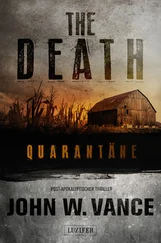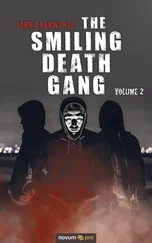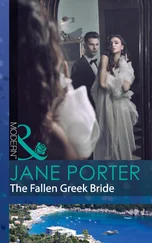“Perhaps you will tell us what we can do. And what we can take—blankets?”
“Ay, we’re well enough supplied with blankets.”
“And our maps?”
One of the searchers came up and reported to him:
“Reckon we’ve got everything worth having, Mr Spruce. Food and stuff. And the guns. Willie’s syphoning the petrol.”
“In that case,” Mr Spruce said, “you can go and help yourselves to what you want. I shouldn’t carry too much, if I were you. You won’t find the going so easy. If you follow the river round”—he pointed to the right—“it’s your best way for getting round the town.”
“Thank you,” Roger said. “You’re a great help.”
Mr Spruce regarded him with beady benevolence. “You’re lucky—getting here before the rush, like. We shan’t have time to gossip with ’em once they start coming in fast.”
You’ve got a great deal of confidence,” John said. “But it isn’t going to be as easy as you think it is.”
“I read somewhere once,” Mr Spruce said, “how the Saxons laughed and chatted together before the Battle of Hastings {109} 109 Hastings, Battle of: where William the Conqueror defeated the Saxons under King Harold (1066)
. That was when they’d just had one big battle and were getting ready for the next.”
“They lost that one,” John said. “The Normans won.”
“Maybe they did. But it was a couple of hundred years before they travelled easy in these parts. Good luck, mister.”
John looked at the cars, stripped already of food and weapons and with Willy, a youth lean and gangling and intent, completing the syphoning of the petrol.
“May you have the same luck,” he said.
John said: The important thing is to get away from here. After that we can decide the best plan to follow. As far as our things are concerned, I suggest we take three small cases for the present. Rucksacks would have been better, but we haven’t got them. I shouldn’t bother with blankets. Fortunately, it’s summer. If it’s chilly, we shall have to huddle together for warmth.”
“I shall take my blanket roll,” Pirrie said.
“I don’t advise it,” John told him.
Pirrie smiled, but made no reply.
The Masham men, having removed their booty, had faded back into the shadows that lined the road, and were watching them with impassive disinterest. The children, sleepy-eyed and unsteady, watched also as their elders sorted out what they needed from what had been left. John realized that he no longer counted Mary as one of the children; she was helping Ann.
They got away at last. Looking back, John saw that the Masham men were pulling the abandoned cars round to reinforce the barrier they had already set up. He wondered what would happen when the cars really began to pile up there—probably they would shove them into the river.
They toiled up rising ground, until they could look down, from a bare field, on the starlit roofs of the town lying between them and the moors. The night was very quiet. “We’ll rest here for a while,” John said. “We can consider our plans.”
Pirrie dropped the blanket roll; he had been carrying it, at first awkwardly under his arm and then more sensibly balanced on his shoulder.
“In that case, I can get rid of these blankets,” he said.
Roger said: “I wondered how long it would be before you realized you were carrying dead weight.”
Pirrie was busy undoing the string that tied the roll; it was arranged in a series of complicated knots. He said:
“Those people down there… excellent surface efficiency, but I suspect the minor details are going to trip them up. I rather think the man who went through my car wasn’t even carrying a knife. If he was, then his negligence is quite inexcusable.”
Roger asked curiously: “What have you got in there?”
Pirrie looked up. In the dim starlight, he appeared to be blinking. “When I was considerably younger,” he said, “I used to travel in the Middle East— Trans-Jordan, Iraq, Saudi Arabia. I was looking for minerals—without much success, I must add. I learned the trick there of hiding a rifle in a blanket roll. The Arabs stole everything, but they preferred rifles.”
Pirrie completed his unravelling. From the middle of the blankets, he drew out his sporting rifle; the telescopic sight was still attached.
Roger laughed, loudly and suddenly. “Well, I’m damned! Things don’t look quite so bad after all. Good old Pirrie.”
Pirrie lifted out a small box in addition. “Only a couple of dozen rounds, unfortunately,” he said, “but it’s better than nothing.”
“I should say it is,” said Roger. “If we can’t find a farmhouse with a car and petrol, we don’t deserve to get away with it. A gun makes the difference.”
John said: “No. No more cars.”
There was a moment’s silence. Then Roger said:
“You’re not starting to develop scruples, are you, Johnny? Because if you are, then the best thing you can do with Pirrie’s rifle is shoot yourself. I didn’t like the way those bastards down there treated us, but I have to admit they had the right idea. It’s force that counts now. Anybody who doesn’t understand that has got as much chance as a rabbit in a cage full of ferrets.”
Only this morning, John thought, his reasons might have been based on scruples; and along with those scruples would have gone uncertainty and reluctance to impose his own decision on the others. Now he said sharply:
“We’re not taking another car, because cars are too dangerous now. We were lucky down there. They could easily have riddled us with bullets first and stripped the cars afterwards. They will have to do that eventually. If we try to make it to the valley by car, we’re asking for something like that to happen. In a car, you’re always in a potential ambush.”
“Reasonable,” Pirrie murmured. “Very reasonable.”
“Eighty odd miles,” Roger said. “On foot? You weren’t expecting to find horses, were you?”
John gazed at the weed-chequered ground on which they stood; it looked as though it might once have been pasture.
“No. We’re going to have to do it on foot. Probably it means three days, instead of a few hours. But if we do it slowly, it’s odds on our making it The other way, it’s odds against.”
Roger said: “I’m for getting hold of a car, and making a run for it There’s a chance we shan’t meet any trouble at all; there won’t be many towns will have organized as quickly as Masham did—there won’t be many that will have the sense to organize anyway. If we’re making a trek across country with the kids, we’re bound to have trouble.”
“That’s what we’re going to do, though,” John said.
Roger asked: “What do you think, Pirrie?”
“It doesn’t matter what he thinks,” John said. “I’ve told you what we’re going to do.”
Roger nodded at the silent watchful figure of Pirrie. “He’s got the gun,” he said.
John said: “That means he can take over running the show, if he has the inclination. But until he does, I make the decisions.” He glanced at Pirrie. “Well?”
“Admirably put,” Pirrie remarked. “Am I allowed to keep the rifle? I hardly think I am being particularly vain in pointing out that I happen to have the greatest degree of skill in its use. And I am not likely to develop ambitions towards leadership. You will have to take that on trust, of course.”
John said: “Of course you keep the rifle.”
Roger said: “So democracy’s out. That’s something I ought to have realized for myself. Where do we go from here?”
“Nowhere until the morning,” John said. “In the first place, we all need a night’s sleep; and in the second, there’s no sense in stumbling about in the dark in country we don’t know. Everybody stands an hour’s watch. I’ll take first; then you, Roger, Pirrie, Millicent, Olivia”—he hesitated—“and Ann. Six hours will be as much as we can afford. Then we shall go and look for breakfast.”
Читать дальше
